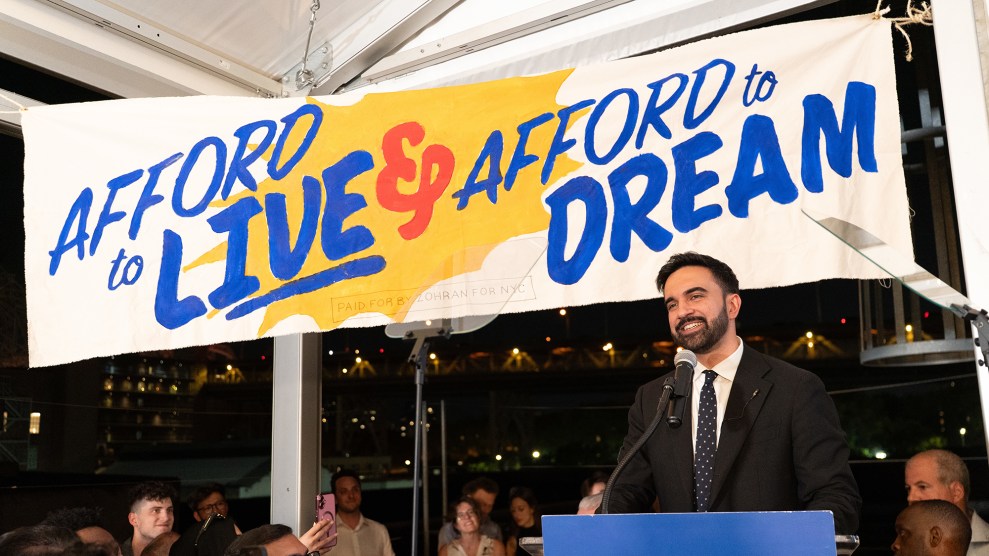
New York City mayor-elect Zohran Mamdani connected combating climate change to increasing affordability.Heather Khalifa/AP
This story was originally published by Grist and is reproduced here as part of the Climate Desk collaboration.
Tuesday was a great day at the ballot box for the planet, with climate-friendly initiatives and candidates winning nationwide.
In races from New York to Georgia to Washington, voters backed funding renewables, reining in energy costs, and building out mass transit—and the people promising to deliver those policies. On the whole, the results suggest Americans are pushing back against President Donald Trump’s efforts to roll back climate action.
“This election was a decisive rejection of the Trump Administration’s ban on clean energy, multimillion-dollar taxpayer bailouts for expensive dirtier energy sources like coal, and other ineffective proposals that will make costs go even higher,” Sara Schreiber of the League of Conservation Voters said in a statement.
“I think yesterday was a repudiation of the idea that Americans don’t care about energy or climate and these are losing issues.”
One of the day’s biggest wins came in New York City, where Zohran Mamdani won the mayoral race in a landslide victory called just 35 minutes after polls closed. More than two million New Yorkers voted, the most in a mayoral race since 1969. Although Mamdani, who at 34 will be the city’s youngest mayor in more than a century, made affordability the predominant focus of his campaign, he garnered an endorsement from the youth-led climate organization Sunrise Movement. Many saw his campaign promises, which included calls for free mass transit and the greening of public schools, as the seeds of a populist climate movement.
“Zohran was talking about climate action in a way people could understand, and people were able to see the impacts of this climate action in their everyday lives,” Denae Ávila-Dickson, Sunrise’s communications and political manager, told New York Focus.
Dan Jasper, of the nonprofit group Project Drawdown, said Mamdani’s transit proposal “is not as sexy as something like solar. But these are the exact type of policies we’re going to need to actually address climate change, because it addresses people’s standards of living.”
Mamdani’s challenge will be assembling the coalition needed to make those policies happen. Boston Mayor Michelle Wu, who has also promoted a municipal green new deal agenda, may not have similar difficulty. Yesterday, Wu’s City Council allies retained their seats, giving her a fighting chance at success.
As far as statewide elections go, Georgia was a point of contention: There, electricity prices were on the ballot. Democrats won two of the five seats on the Public Service Commission, a regulatory agency that oversees utilities and has approved six rate increases in three years.
Democrats have not held a seat on the board since 2007, but clean energy consultant Peter Hubbard and anti-poverty advocate Alicia Johnson tapped voter outrage over climbing prices and notched upset victories over Republican incumbents, who had embraced fossil fuels and backed away from clean energy at a time when demand for power is rising.
“I think for a lot of folks who have felt powerless over rising utility bills, especially in a state like Georgia where they’ve gone up for the average household by more than $500 in just the last couple of years, they can finally breathe a sigh of relief knowing that potential change is coming,” said Charles Hua, founder of the utility advocacy nonprofit PowerLines.
Rising energy bills emerged as a top issue in other races, too, including the governor’s races in New Jersey and Virginia. For political scientist Leah Stokes, who studies public opinion around climate change, Tuesday’s results weren’t unexpected.
“I think yesterday was a repudiation of the idea that Americans don’t care about energy or climate and these are losing issues, which is what all of these pundits have been going on and on about for about 9 months now. That’s really wrong,” Stokes said on Wednesday. “Everyday people understand that clean energy is cheap energy—they can easily make those connections.”
“‘Climate action equals affordability’ seems to be the winning message of the day.”
In New Jersey, governor-elect Mikie Sherrill vowed to declare “a state of emergency on energy costs” on her first day in office. She plans to roll out expanded generation capacity, including rooftop solar and battery storage, and “immediately develop plans for new nuclear capacity.”
In Virginia, Abigail Spanberger won the governor’s seat on a platform that included data center operators paying for their own electricity costs in a region that currently hosts over 13 percent of the world’s data center capacity. Her “Affordable Virginia” plan included calls to expand wind and solar power, promote home weatherization to ease power consumption, and streamline permitting and other requirements for expanding generation.
To the west, California voters approved Proposition 50, which will allow the state’s Democratic majority to sidestep the statewide redistricting commission and redraw congressional districts ahead of the 2026 midterm elections. The move was designed to give Democrats as many as five more seats in Congress in an effort to, among other things, combat further dismantling of climate and environmental policy. Governor Gavin Newsom and a slate of prominent Democrats nationwide championed the proposal as a counterbalance to Republican-led redistricting in states like Texas, where a similar effort earlier this year carved out 5 new seats for the GOP.
In a speech Tuesday night, Newsom said California voters approved the measure “to send a message to Donald Trump. No crowns, no thrones, no kings. That’s what this victory represents. [It] is a victory for the people of the state of California and the United States of America.”
Climate-friendly policies—those centering on transit, in particular—won on a local scale, too. Voters in Mecklenburg County, North Carolina, which includes the city of Charlotte, handily approved a 1 percent increase in the sales tax to finance nearly $20 billion in transportation improvements. Although 40 percent of the additional revenue will be allocated to roads, some of that funding will support new bike lanes and sidewalks. Another 40 percent will go toward rail, and the remainder will be dedicated to buses and microtransit. In Ellensburg, Washington, 65 percent of voters approved a permanent 0.2 percent sales tax to fund the municipal bus system.
Across the country, one thing was clear: Wallet-friendly climate policies—and candidates presenting themselves as helping people pay their bills—won. “Climate change isn’t at the forefront of every election, but at this point, every election is a climate election,” Jasper of Project Drawdown said. “‘Climate action equals affordability’ seems to be the winning message of the day.”
Emily Jones contributed reporting.


















